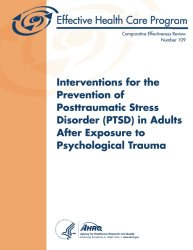$24.99
$24.99
(SAVE Now!)
as of 04/26/2024 (Details)
Posttraumatic stress disorder (PTSD) may develop following exposure to a traumatic event. According to the fourth edition of the “Diagnostic and Statistical Manual of Mental Disorders, Text Revision” (DSM-IV-TR), the essential feature of PTSD is the development of characteristic symptoms following exposure to an extreme traumatic stressor. The stressor may include having direct personal experience of an event that involves actual or threatened death or serious injury or other threat to one’s physical integrity; witnessing an event that involves death, injury, or a threat to the physical integrity of another person; or learning about unexpected or violent death, serious harm, or threat of death or injury experienced by a family member or other close associate. The DSM-IV-TR also requires that the person’s subjective response to the event involve intense fear, helplessness, or horror. Some traumatic events that are directly experienced or to which individuals can be exposed include military combat, violent personal assault, being taken hostage, a terrorist attack, torture, natural or manmade disasters, and being diagnosed with a life-threatening illness. Psychological trauma is common and leads to PTSD in a substantial number of adults exposed to trauma. The 1990–1992 National Comorbidity Survey indicated that 60 percent of men and 51 percent of women reported experiencing at least one traumatic event in their lifetimes. Shortly after exposure, many people experience some symptoms of PTSD; in most people, those symptoms resolve within several weeks of the trauma. However, in approximately 10 to 20 percent, PTSD symptoms persist and are associated with impairment in functioning. Although approximately 50 percent of those diagnosed with PTSD improve without treatment in 1 year, 10 to 20 percent develop a chronic unremitting course. Prevention of PTSD can potentially reduce a significant burden of individual and societal suffering. Two different prevention strategies have been used. The first strategy, universal prevention, is to deliver interventions to all people exposed to a trauma, regardless of symptoms or risk of developing PTSD. The second strategy, targeted prevention, is based on the fact that although many people experience some symptoms of PTSD after trauma, only a relatively small percentage develop the psychiatric disorder of PTSD and its associated disability. The goal of targeted prevention is to identify, from among all people exposed to a trauma, those who are at high risk of developing the disorder of PTSD and then intervene only with those at high risk. Interventions to prevent PTSD involve various psychological and pharmacological approaches; they also include emerging interventions such as approaches from complementary and alternative medicine. In this review, we address the following KQs: KQ 1: For adults exposed to psychological trauma, what is the efficacy or comparative effectiveness (or both) of early interventions to prevent PTSD or to improve health outcomes? KQ 2: For adults exposed to psychological trauma, does timing, intensity, or dosage of intervention have an impact on the effectiveness or harms of approaches to prevent PTSD or to improve health outcomes? KQ 3: For adults exposed to psychological trauma, how does efficacy, effectiveness, or harms of early interventions to prevent PTSD differ for characteristics of traumatic exposure or subpopulations with respect to: demographic groups (defined by age, ethnic and racial groups, and sex), psychiatric comorbidities, or personal risk factors for developing PTSD (e.g., having a diagnosis of acute stress disorder (ASD) vs. not having the diagnosis)? KQ 4: For adults exposed to psychological trauma, what are the absolute and comparative risks of harms from early interventions to prevent PTSD?
Technical Details
No features available.